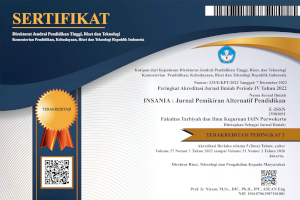Aliran Pendidikan Islam Tradisionalis-Tekstualis (Studi Pemikiran Al-Qabisi)
DOI:
https://doi.org/10.24090/insania.v18i1.1444Abstract
Abstract: In the history of civilization, Islam produced many great thinkers and leading scholars in various fields, such as education. Among Muslim thinkers who wrestled in education is al-Qabisi. Educational thought and al-Qabisi represent and reinforce the philosophy of life and socio-cultural conditions of society in his day who is a religious social environment, where atheism and materialism not obtain a place, while the al-Quran and prayer has become an indispensable part of people’s lives. By looking at these facts, it is understandable that there is the impression and feel a very strong religious education in mind, so Muhammad Jawwad Ridla put into groups of religious education stream conservative or traditional-textual. Although the label is pinned on educational thought al-Qabisi is a traditional-textual, this study proves that many of the items thinking that al-Qabisi contextual and still remain in accordance with the conditions today, for example, his concept of the active learning strategies, peer teaching , exemplary methods of moral education, the principle of equality in education, love approach in education, and also about the ethics of the teaching profession. Keywords : al-Qabisi, thought, traditionalists, textualist.Downloads
Published
How to Cite
Issue
Section
License
Authors who publish with this journal agree to the following terms:
Authors retain copyright and grant the journal right of first publication with the work simultaneously licensed under a Creative CommonsAttribution-ShareAlike License that allows others to share the work with an acknowledgment of the work's authorship and initial publication in this journal.
Authors are able to enter into separate, additional contractual arrangements for the non-exclusive distribution of the journal's published version of the work (e.g., post it to an institutional repository or publish it in a book), with an acknowledgment of its initial publication in this journal.
Authors are permitted and encouraged to post their work online (e.g., in institutional repositories or on their website) prior to and during the submission process, as it can lead to productive exchanges, as well as earlier and greater citation of published work (See The Effect of Open Access).








